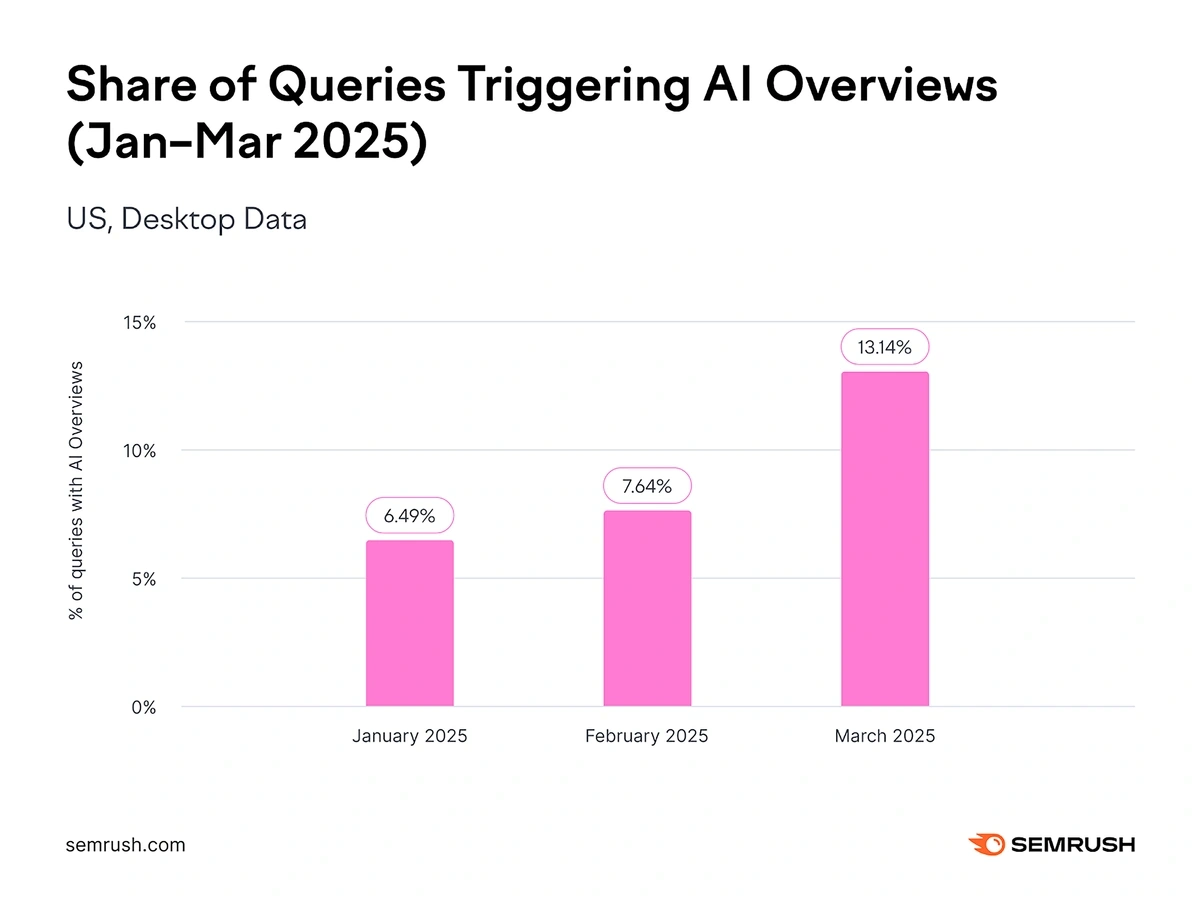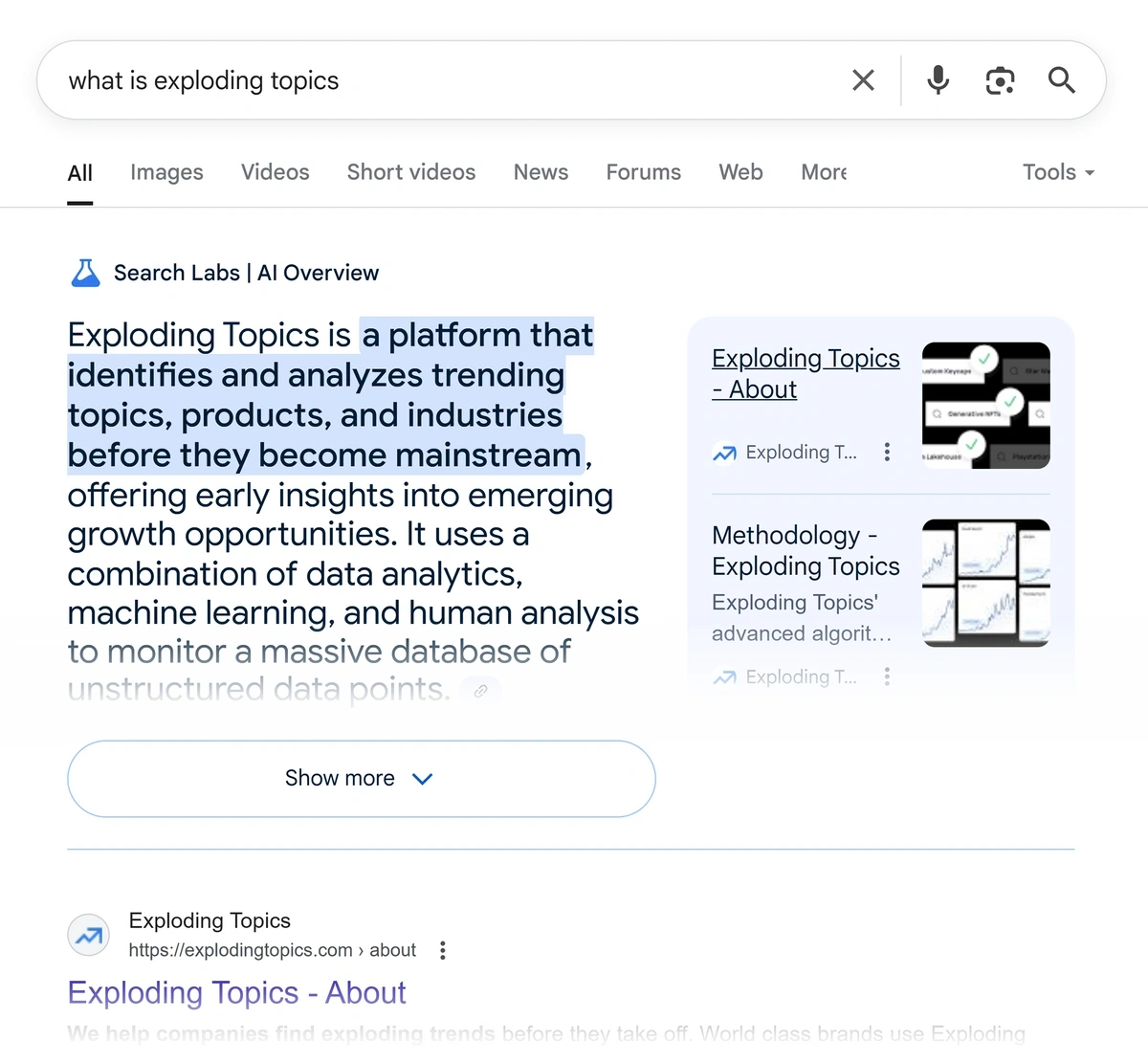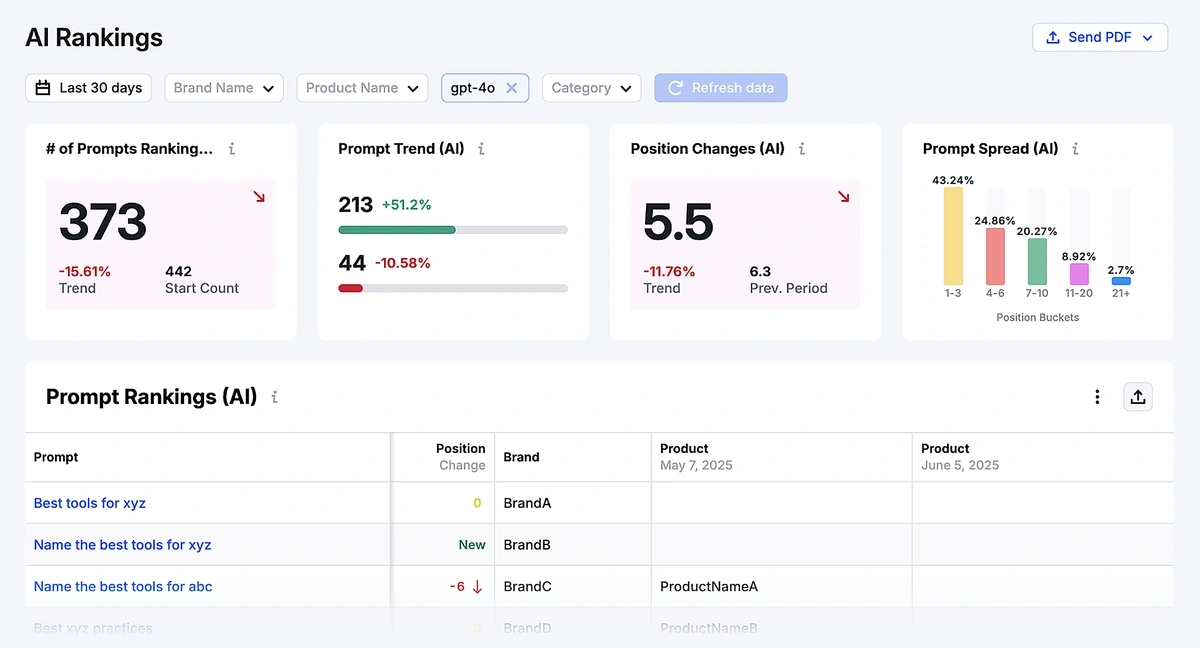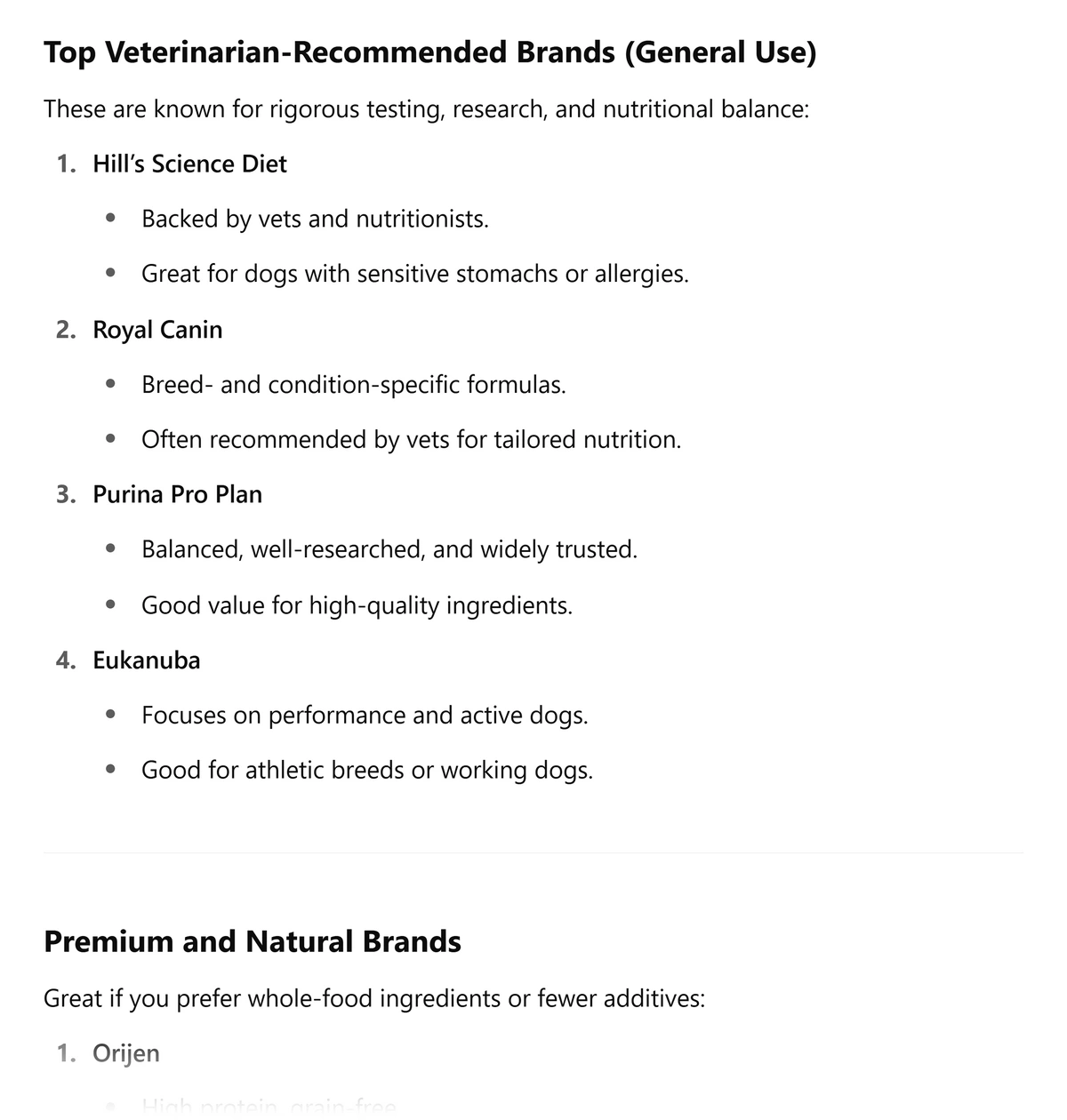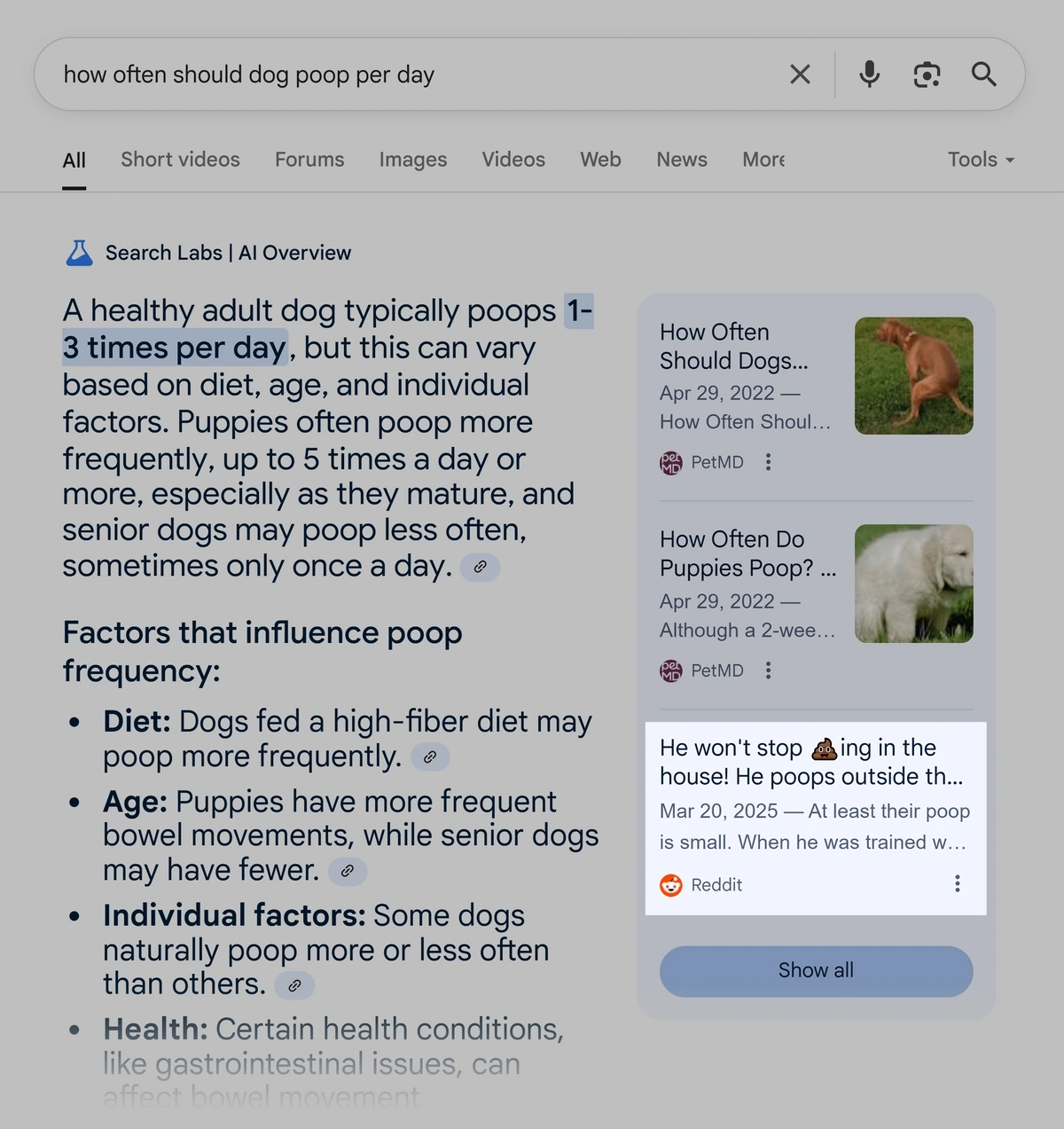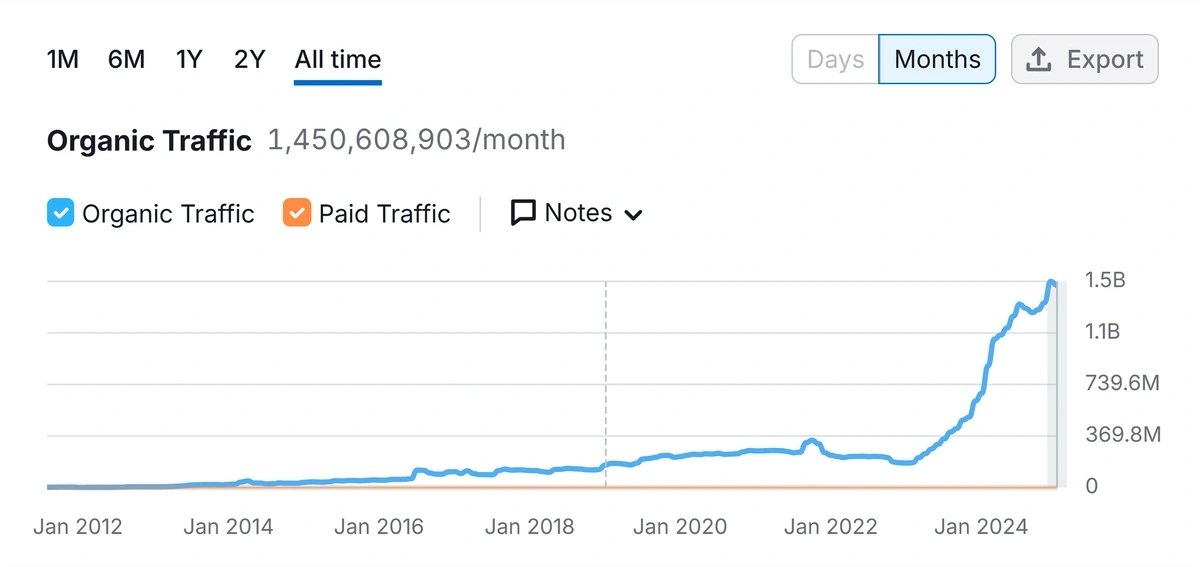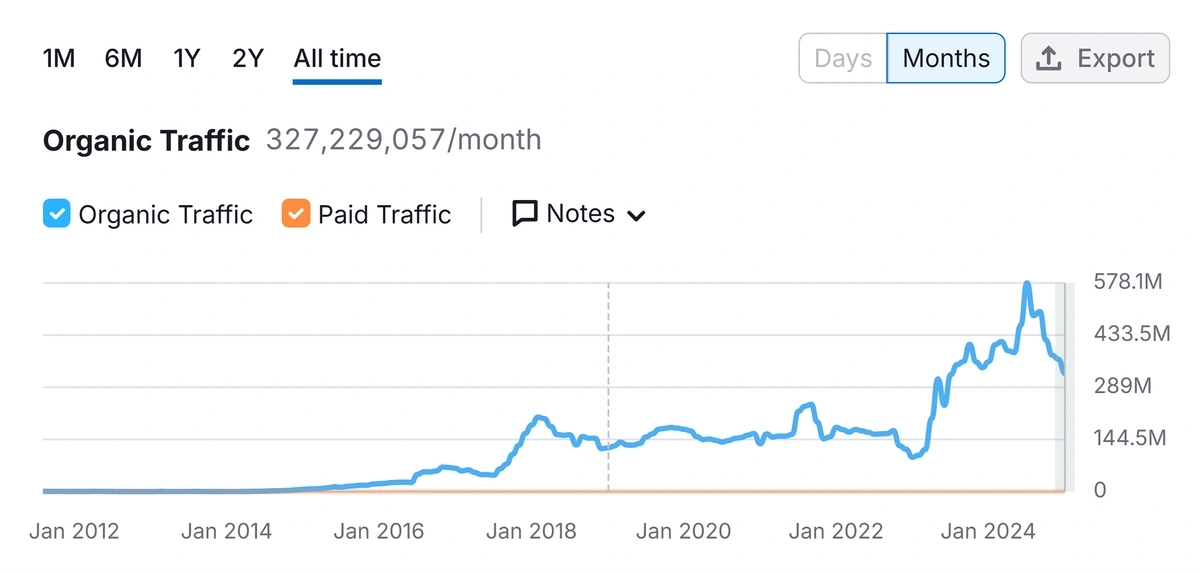Get Advanced Insights on Any Topic
Discover Trends 12+ Months Before Everyone Else
How We Find Trends Before They Take Off
Exploding Topics’ advanced algorithm monitors millions of unstructured data points to spot trends early on.

Keyword Research
Performance Tracking
Competitor Intelligence
Fix Your Site’s SEO Issues in 30 Seconds
Find technical issues blocking search visibility. Get prioritized, actionable fixes in seconds.
Powered by data from
Future of Search: Why LLMs Will Drive 75% of Revenue by 2028
Large Language Model (LLM) search is quickly changing how users access information online, posing both new opportunities and challenges for marketers.
Semrush conducted a study to examine how AI search platforms, including Google AI Overviews, Google AI Mode, ChatGPT, Claude, and Perplexity, could impact search traffic and revenue for companies over the next five years.
The study is based on a focused list of over 500 high-value digital marketing and SEO-related topics and subtopics, translated into specific search terms and prompts.
The findings in this study are eye-opening and provide critical insights to help the digital marketing industry prepare for an AI-driven future.
Below, we explain more about what LLM search is, the key takeaways from the study, and how you can optimize for LLM search.
Get More Search Traffic
Use trending keywords to create content your audience craves.
What is LLM Search, and Why Should You Care About It?
LLM search refers to the use of AI-driven chatbots and large language models (LLMs), such as ChatGPT, Google Gemini, and Claude, to gather information, rather than relying on traditional Google search to look up answers. These LLMs can deliver conversational, synthesized answers to user prompts.
Since the launch of ChatGPT, the growth of generative AI and AI search has been rapid.
The search interest for “AI search” has increased by 3,233% over the last five years.
Unlike traditional Google SERPs, which feature link-based results, these large language models prioritize direct, personalized responses while citing sources for credibility. Even when you use Google, you'll see AI Overviews for most queries, which relies on Google's Gemini LLM.
Additionally, LLM search is built for quick-hitting answers. Generative search LLMs compete with one another on overall user experience.
In comparison, traditional search engines are built for blue links, own the web traffic themselves, and compete with one another in functionality rather than user experience.
So why should you care?
Well, if you’re relying on organic search traffic for your business, then LLM search will eventually (if not already) have an impact on you.
In fact, if generative search were to become the primary choice for users to conduct research, solve problems, learn new information, and find shopping recommendations, then search engines would no longer own the monopoly on user intent.
In this new era, AI search optimization is a must.
We can use Google Overviews as an example to understand the impact.
As of March 2025, 13.14% of all queries generated an AI Overview. Of all the queries that do trigger an AI Overview, 88.1% are informational.
The least impacted query type is navigational searches, highlighting the importance of brand authority.
However, it’s something to monitor because the number of navigational queries triggering AI Overviews has doubled since January, from 0.74% to 1.43%.
(And when users encounter an AI Overview, only 8% always click through to the source material.)
This rapid adoption signals a shift in the way users are interacting with LLMs and Google, indicating a need for businesses to build their brand and rely on alternative channels for traffic.
LLM Search Vs. Google Search
As mentioned, LLM search and traditional Google Search operate on fundamentally different principles. Traditional Google Search delivers ranked links that drive measurable traffic through clicks and direct navigation.
However, with the introduction of AI Overviews (AIOs) and AI Mode, Google is becoming an exception by combining both search experiences for users.
In comparison, LLM search platforms provide synthesized, conversational answers that prioritize impressions, brand citations, and direct responses (often without a click). It’s becoming harder to track LLM search because it’s common to receive answers with unlinked brand mentions and citations.
Google’s overall search value (outside of AIOs and AI Mode) is easier to track with existing attribution models. LLM search value is more difficult and requires new visibility and brand perception metrics.
As users become more familiar with LLMs, we expect more people to rely on these platforms over traditional search results.
It’s apparent that Google feels the same. Google’s AI Overviews include AI-generated summaries, source links, and a “show more” tab to expand the results.
According to the latest data, Google reports that 1.5 billion users now regularly use AI Overviews.
Searches for “AI overviews” have increased by 9,800% over the last two years.
AI Overviews even answer information queries about brands. Here’s an example of an AI overview for an Exploding Topics-related query.
Additionally, Google recently released AI Mode, which is essentially a ChatGPT alternative available right in your Google search window. Instead of blue links and a traditional Google SERP layout, you can work within this LLM to ask questions, find information, conduct research, etc.
According to Semrush projections, AI search traffic is expected to surpass traditional organic search traffic by 2028. Here’s a look at the traffic share projections:
| Traffic Share | 2025 | 2026 | 2027 | 2028 | 2029 |
| Traditional Organic Search | 97% | 83% | 52% | 25% | 13% |
| LLMs | 4% | 17% | 48% | 75% | 87% |
On the surface, this may seem scary. But we’ve learned that LLM traffic is actually more valuable than Google traffic.
Want to Spy on Your Competition?
Explore competitors’ website traffic stats, discover growth points, and expand your market share.
On average, a website visitor from ChatGPT is 4.4 times more likely to convert than the average visitor from traditional organic search.
This is because LLM results tend to inform users more before they click through to your site. They have the necessary information and a better understanding of whether your solution solves their problem.
This puts these searchers closer to making a final buying decision compared to the tire kicker in Google who still needs to gather additional information.
So, what’s the next step?
Consider tracking your brand’s visibility in LLMs and AI search. One way to do so is with Semrush Enterprise AIO.
This LLM visibility tool allows you to create prompts relevant to your business across different stages of the buyer journey. It uses those prompts to see how you and your competitors rank across the most popular LLMs and whether your current strategy is working.
For example, a technology brand selling computer equipment might display prompts such as “best laptops for coding” or “top monitors for graphic design.”
If you’re not ready for an enterprise product, there are more suitable alternatives. You can use the Semrush AI Visibility Toolkit instead to track your brand’s visibility in AI and LLM search.
How LLMs Are Already Changing User Behavior
Zero-Click Searches are Increasing
Zero-click searches have been something marketers have monitored in Google, even before AI.
In October 2022 (before ChatGPT was released), Semrush found that 57% of mobile users and 53% of desktop users perform a search and don’t click on any results (both organic and paid).
The rise of LLMs and the increasing use of AI in search have certainly heightened these concerns. It's a process known as The Great Decoupling: rising impressions, but falling clicks.
For starters, queries that trigger an AI Overview have higher no-click rates on average than searches that don’t include an AI Overview.
The latest data showed that 43.11% of queries with an AI overview did not receive a click. In comparison, only 34.25% of queries without an AI Overview resulted in no clicks.
Surprisingly, the numbers actually look better today than in January 2025. However, AI Overview results still lag behind results without one, indicating the impact of LLM search.
There’s another way LLMs impact click-through rates. And this is happening in the form of unlinked brand mentions.
More specifically, LLMs are answering queries by mentioning a brand, but they’re not linking to that brand’s website.
When this happens, a user is more likely to get a recommendation from ChatGPT and then type in the brand’s name to Google or go directly to their website. As of now, there’s no way to track this because it appears as either organic search traffic or direct traffic.
Here’s an example from ChatGPT for the query “what's the best dog food?”
As you can see, ChatGPT is recommending multiple brands, but without linking to any of them. As a shopper, I’d likely consider which category I want to shop in and head to Google to find the brand.
Even though (in this case), the traffic is not coming directly from LLM search, this is the perfect example of why LLM search visitors are higher value. They’re more informed and ready to buy compared to someone typing “what's the best dog food” into Google.
User-Generated Content Ranks First
User-generated content (UGC) is an SEO trend that we’ve been monitoring, and it's something LLMs are increasingly prioritizing. This includes reviews, forum posts, and social media discussions, as these sources often provide authentic, context-rich insights.
Two platforms in particular perform exceptionally well compared to others: Quora and Reddit.
According to Semrush’s study, Quora is the most commonly cited source in Google AI Overviews, followed by Reddit.
Content written by people for people tends to be more relevant and authentic, something Google rewards websites for doing.
Google and Reddit also have a partnership, which could affect how well Reddit's content performs in the SERP and in AI Overviews.
Other commonly cited domains in AI Overviews include:
- YouTube
- The New York Times
- Amazon
- Travel + Leisure
- Healthline
- Bankrate
- Forbes
All of these sites are high authority domains with strong SEO profiles and organic search rankings.
Check out both Reddit and Quora’s traffic growth:
Since June 2023, Reddit’s organic traffic has increased from 175.9 million to 1.45 billion.
Despite a recent decline, Quora’s traffic is still way up over the past two years.
Quora’s traffic has grown from 95.07 million to 337.99 million since June 2023.
Business and Service Sites Perform Well
LLM search currently favors business and service-oriented sites that provide clear, actionable information, especially for local and commercial intent queries.
Semrush's research shows that 50% of all links included in ChatGPT are for business or service websites.
| Site Category | % of Links |
| Business/Service Sites | 50.00% |
| News/Media Sites | 9.50% |
| Blog/Content Sites | 8.30% |
| E-commerce Sites | 7.60% |
| Unsure/Other | 7.30% |
| Forums/Community Sites | 5.60% |
| Educational Sites | 4.00% |
| Directory/Review Sites | 3.70% |
| Government/Institutional Sites | 2.00% |
| Social Networks | 2.00% |
There is a similar distribution for individual LLMs, such as Perplexity Sonar and Gemini 1.5 Pro.
These LLMs all prioritize links to business or service sites, meaning it should be a top priority for organizations to optimize their sites for LLM search.
Below, we’ll show you how you can optimize for LLM search and what steps you should take.
How to Optimize for LLM Search
1. Structure Content for Easier AI Analysis
LLMs favor clearly structured, factually rich content that directly answers questions. In order to get mentioned in LLM answers, you'll need to optimize your content accordingly.
Actionable Steps:
- Use descriptive, concise headings: Break content into scannable sections with H1, H2, and H3 tags that clearly describe the topic.
- Incorporate bullet points and numbered lists: Summarize key information in lists to make facts easily extractable. For instance, list the benefits of a product or the steps in a process.
- Create FAQ sections: Address common questions directly with concise answers. Use question-based subheadings, such as "What is keyword research?", to align with user queries.
- Add comparison tables: Present data side by side (e.g., features, pricing) to simplify analysis. Try to create tables that are labeled clearly with column headers.
- Ensure factual accuracy: Cross-check data with reputable sources and cite them to boost credibility. Avoid vague or unsubstantiated claims.
- Optimize for readability: Use short sentences and paragraphs. Aim for a 6th- to 8th-grade reading level so the content is clear and skimmable.
With Semrush’s ContentShake AI, you can generate full articles that are SEO-ready.
All you have to do is enter niche details, topic ideas, and keywords you want to target, and the tool does the rest. Not only does it write the article, but it structures it so LLMs can easily pull answers from it for searchers.
2. Target Comparative and Question-Based Prompts
LLMs frequently process comparative queries (e.g., "X vs. Y") and question-based prompts (e.g., "How to do Z?"). You can improve your success in LLM search and increase visibility by tailoring content to match these formats.
Actionable Steps:
- Identify high-value questions: Use tools like Semrush’s Keyword Magic Tool to find question-based keywords relevant to your niche, such as "How to improve site speed?" or "What is link building?"
- Create comparative content: Write articles or sections comparing products, services, or strategies (e.g., "Exploding Topics vs. Google Trends”). Highlight pros, cons, and unique features for each brand mentioned.
- Answer queries directly: Start sections with clear answers to questions, followed by detailed explanations. For example, when answering "What is keyword mapping?", start with a concise one-sentence definition.
- Use structured data: Implement FAQ or HowTo schema markup to make question-based content more discoverable by AI crawlers.
- Target long-tail keywords: Focus on specific, low-competition phrases, such as "best budget-friendly SEO tools for small businesses," to capture niche LLM queries.
Performing thorough keyword research to know what topics to target is how you can beat your competitors in LLM search. Semrush Enterprise AIO will help you find long-tail keyword prompts to target and track your visibility in LLMs.
3. Build a Consistent Digital Footprint
LLMs rely on a brand’s online presence to assess the authority and relevance of their content. A consistent digital footprint across platforms increases your chances of being cited by AI models.
Actionable Steps:
- Maintain uniform branding: Ensure your brand name, logo, and messaging are consistent across your website, social media (e.g., LinkedIn, X), and directories.
- Optimize your website’s E-E-A-T: Showcase Expertise, Experience, Authoritativeness, and Trustworthiness by including author bios, linking to credible sources, and displaying trust signals like SSL certificates or customer reviews.
- Publish regularly across channels: Share blog posts, case studies, or updates on your site and repost them on platforms like X, LinkedIn, and Facebook.
- Engage with communities: Participate in relevant forums, Q&A sites, or social platforms to establish thought leadership and increase brand mentions.
With Semrush’s Brand Monitoring tool, you can track your brand mentions across the web, identify new backlink opportunities, analyze customer sentiment, and make sure your messaging is consistent to boost your authority and visibility in LLM search results.View our Otterly.ai vs Semrush comparison for a more comprehensive account.
Getting Ready for the Future with LLM Search
Optimizing for LLM search is more than just a quick tactic for search traffic today. It’s a strategic move to secure your brand’s place in an AI-driven future.
LLMs rely on patterns within massive datasets to deliver answers. By optimizing your content and digital presence now, you can feel confident that your brand will be referenced more often (and more accurately) in search results in the future.
AI search monitoring is also now more important than ever.
With the projections that LLM search value will overtake traditional organic search by 2028, it's better to act now than get caught behind. Tools like Semrush Enterprise AIO and the Semrush AI Visibility Toolkit will help you get started today.
Stop Guessing, Start Growing 🚀
Use real-time topic data to create content that resonates and brings results.
Exploding Topics is owned by Semrush. Our mission is to provide accurate data and expert insights on emerging trends. Unless otherwise noted, this page’s content was written by either an employee or a paid contractor of Semrush Inc.
Share
Newsletter Signup
By clicking “Subscribe” you agree to Semrush Privacy Policy and consent to Semrush using your contact data for newsletter purposes
Written By


Anthony is a Content Writer at Exploding Topics. Before joining the team, Anthony spent over four years managing content strat... Read more





